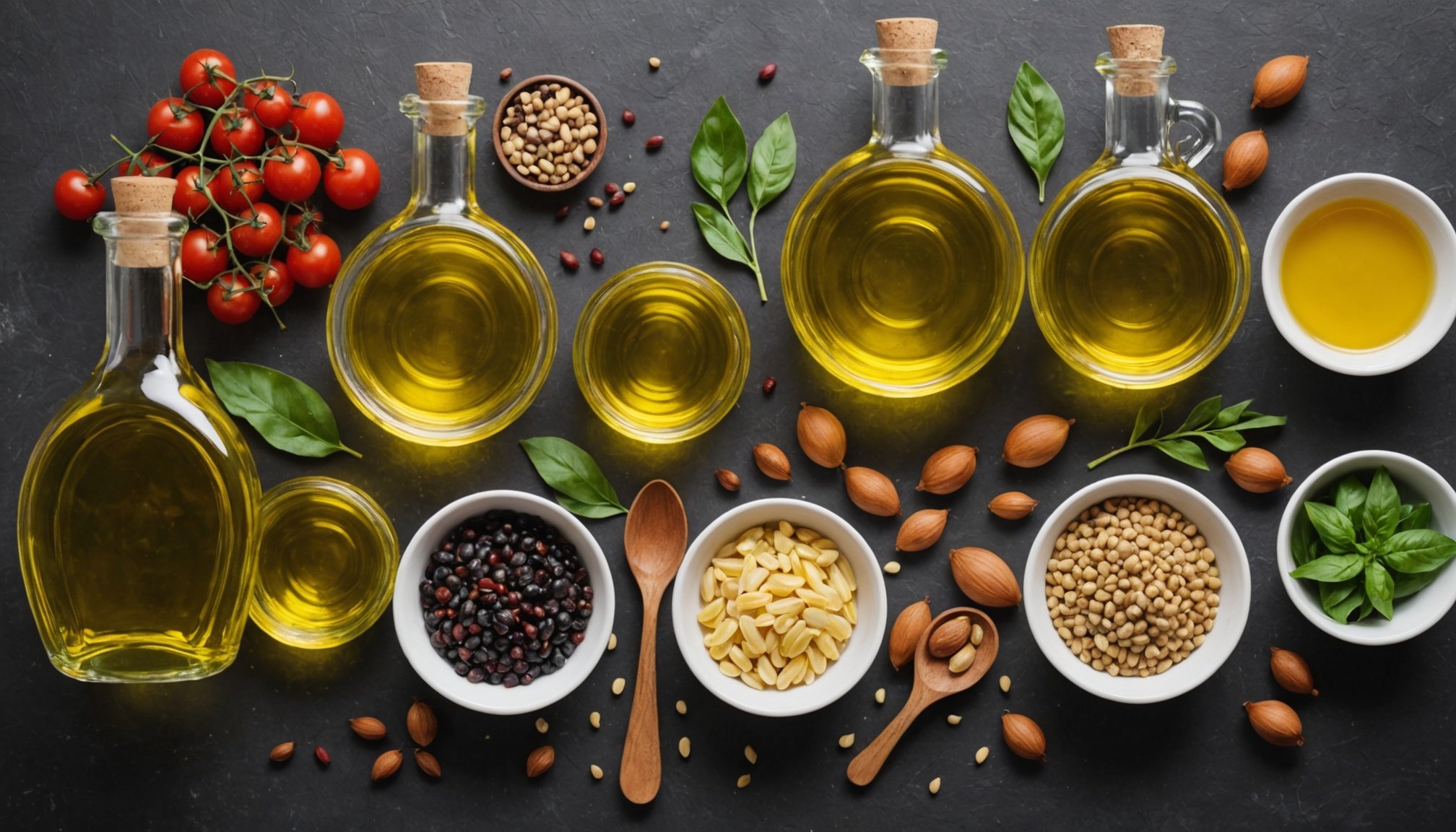Discover the Heart-Healthy Cooking Oils You Can Find in UK Supermarkets!
In the midst of a bustling kitchen, the choice of cooking oil can often be overlooked, but it is a crucial decision that can significantly impact your health and the flavor of your dishes. With the myriad of options available in UK supermarkets, navigating the world of cooking oils can be daunting. Here, we will delve into the heart-healthy cooking oils that you should consider adding to your pantry.
Understanding the Basics of Cooking Oils
Before we dive into the specifics, it’s essential to understand the basic characteristics of cooking oils. Here are a few key terms to keep in mind:
Also to see : Mastering Jet Lag: Top Strategies for UK Business Travelers to Stay Energized
- Smoke Point: The temperature at which an oil begins to break down and smoke. This is crucial for high-heat cooking.
- Saturated Fats: Fats that are solid at room temperature and can increase cholesterol levels.
- Polyunsaturated and Monounsaturated Fats: These are generally considered healthier fats that can help lower cholesterol levels.
- Cold-Pressed and Organic: These terms indicate that the oil is less processed and retains more natural flavors and nutrients.
The Star of the Show: Extra Virgin Olive Oil
Extra Virgin Olive Oil (EVOO) is often hailed as the gold standard of cooking oils, and for good reason. According to Maria Dawson of Clearspring, EVOO is one of the best cooking oils for health, thanks to its gut-friendly and anti-inflammatory properties.
Health Benefits
EVOO is rich in oleic acid and polyphenols, which are associated with lower cholesterol levels, better heart health, and a well-supported gut microbiome. Professor Tim Spector, a vocal proponent of EVOO, has extensively discussed its health benefits in various media outlets.
Also to see : Discover the Top Advantages of Reflexology in Managing Stress Across the UK
Usage
While EVOO has a relatively low smoke point of around 190°C, it is perfect for low to medium heat cooking, such as sautéing vegetables or making dressings. For higher heat cooking, it’s best to use other oils.
Market Trends
Despite its high price due to fluctuating harvests, shoppers are increasingly opting for EVOO. Gianfranco Perri of Just Gourmet Foods notes, “We are seeing growing interest in single varietal extra virgin olive oil. Authenticity still wins in a cash-strapped market and, when purse strings are tight, there are still people who value quality over quantity”.
Other Heart-Healthy Cooking Oils
While EVOO is a standout, there are several other oils that offer excellent health benefits and versatility in cooking.
Avocado Oil
Avocado oil is a close second in terms of health benefits and usability. It has a high smoke point of around 250°C, making it ideal for high-heat cooking such as frying and roasting. It is also rich in monounsaturated fats, which are beneficial for heart health.
Sesame Oil and Toasted Sesame Oil
Sesame oil, particularly toasted sesame oil, adds a distinct flavor to dishes and is rich in antioxidants. However, it has a low smoke point, making it better suited for marinating, light frying, and baking.
Rapeseed Oil
Rapeseed oil, also known as canola oil in some regions, is gaining popularity in the UK due to its balanced ratio of Omega-3 to Omega-6 fatty acids. It is low in saturated fats and has a high smoke point, making it versatile for various cooking methods.
The Rise and Fall of Sunflower and Vegetable Oils
Sunflower and vegetable oils have been staples in many kitchens, but their popularity is waning due to several factors.
Sunflower Oil
Sunflower oil has a high smoke point of 232°C, making it suitable for deep frying and other high-heat cooking. However, the war in Ukraine, a major exporter of sunflower oil, has significantly increased its price. This has led consumers to seek alternative oils like olive and avocado oil.
Vegetable Oil
Vegetable oil, a blend of various seed oils, is highly processed and has a neutral flavor. However, its high processing level and lack of nutritional benefits have made it less appealing to health-conscious consumers. It has a smoke point of around 204°C, but its use is declining as people opt for healthier alternatives.
Coconut Oil: A Complex Case
Coconut oil is a topic of much debate when it comes to heart health.
Saturated Fat Content
Coconut oil is predominantly composed of saturated fats, with about 86% of its total fat content being saturated. This is significantly higher than olive oil and butter. The American Heart Association recommends limiting saturated fat intake, which makes coconut oil a less favorable choice for daily consumption.
Health Implications
Studies have shown that coconut oil can increase LDL (bad) cholesterol levels, although it also raises HDL (good) cholesterol. However, the overall impact on heart health is not as positive as other oils. It is recommended to consume coconut oil in moderation and as part of a balanced diet.
A Comparative Look at Cooking Oils
Here is a detailed comparison of some of the cooking oils discussed:
| Oil | Smoke Point (°C) | Saturated Fat Content | Health Benefits |
|---|---|---|---|
| Extra Virgin Olive Oil | 190 | 14% | Rich in oleic acid and polyphenols; supports heart health and gut microbiome |
| Avocado Oil | 250 | 10% | High in monounsaturated fats; ideal for high-heat cooking |
| Sesame Oil | 210 | 14% | Rich in antioxidants; best for marinating and light frying |
| Rapeseed Oil | 204-246 | 7% | Balanced Omega-3 to Omega-6 ratio; low in saturated fats |
| Sunflower Oil | 232 | 11% | High smoke point; neutral flavor; currently expensive due to supply issues |
| Vegetable Oil | 204 | 10% | Highly processed; neutral flavor; less nutritional benefits |
| Coconut Oil | 177 | 86% | High in saturated fats; raises LDL cholesterol; consume in moderation |
| Grapeseed Oil | 216 | 10% | High in Vitamin E; light and clean taste; good for dressings and vinaigrettes |
Practical Tips for Choosing the Right Oil
When selecting a cooking oil, here are some practical tips to keep in mind:
- Consider the Smoke Point: For high-heat cooking, choose oils with a high smoke point like avocado oil or rapeseed oil.
- Think About Flavor: If you want a neutral flavor, sunflower or vegetable oil might be a good choice. For distinct flavors, consider sesame or avocado oil.
- Health Benefits: Opt for oils rich in monounsaturated and polyunsaturated fats like EVOO, avocado oil, and rapeseed oil.
- Processing Level: Choose cold-pressed and organic oils to ensure they retain more natural flavors and nutrients.
- Moderation is Key: Even healthy oils should be consumed in moderation as part of a balanced diet.
Choosing the right cooking oil is not just about taste; it’s also about health. With the variety of options available in UK supermarkets, you can make informed decisions that align with your wellness goals. Whether you’re a fan of the rich flavor of EVOO or the versatility of avocado oil, there’s an oil out there that can enhance both the taste and the health benefits of your meals.
As Gianfranco Perri of Just Gourmet Foods aptly puts it, “Authenticity still wins in a cash-strapped market and, when purse strings are tight, there are still people who value quality over quantity.” So next time you’re at the supermarket, take a moment to explore the world of cooking oils and find the ones that best fit your culinary and health needs.











